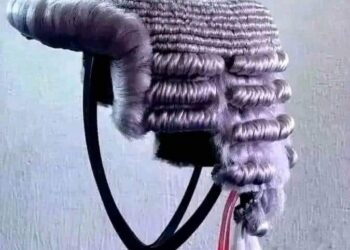Stories by Vivian Okejeme
Abuja
The National Judicial Council (NJC) has disagreed with the Nigerian Bar Association (NBA) on its call for the suspension of judicial officers who are being investigated over alleged corruption by the Department of State Service (DSS).
Speaking at the valedictory court session in honour of retiring Justice Sotonye Deton-West at the Court of Appeal in Abuja, the NBA President, Abubakar Mahmoud (SAN), had called on the embattled judges to step down from the country’s judiciary pending when their names were cleared of all the issues leveled against them.
But in reaction to the NBA, the NJC which is the disciplinary body of all judicial officers in the country, in the statement by its acting Director of Information, Soji Oye, described the call as “unacceptable.”
The council noted that it was not unaware of the views expressed by members of the public and lawyers on the issue, but noted that the NJC could only recommend the appointment and dismissal of any erring judicial official to either the president or the governor of a state as prescribed by the Law establishing it.
Statement which acknowledged that the mandate of the NJC was limited by the provisions in the 1999 Constitution read in part: “NJC is constrained to inform the general public that its constitutional mandate is to process and recommend to the executive at the federal and state levels, the appointment, and or the removal of judicial officers from office, including exercise of its disciplinary control of suspending and or warning Judicial Officers; after complying with due process and the Rule of Law.
“Since the creation of NJC in the 1999 Constitution of the Federal Republic of Nigeria, as amended, it has exercised its powers and performed its functions within its Constitutional limitations.
“Thus, the current position of the Nigerian Bar Association vis-à-vis its recommendation that the affected Judicial Officers involved in the on-going investigation of Judicial Officers by the DSS, be requested to proceed on compulsory leave until the conclusion of all disciplinary proceedings against them, is unacceptable to the NJC; as it breaches the 2014 Revised Judicial Discipline Regulations formulated by NJC pursuant to Section 160 of the 1999 Constitution of the Federal Republic of Nigeria, as amended.”
It further stated that: “It is to be reiterated also that by the provisions of Section 158 of the 1999 Constitution of the Federal Republic of Nigeria, as amended, NJC shall not be subject to the direction or control of any other authority or person while exercising its disciplinary power of control over judicial officers in the Federation.
“The members of the public are hereby informed that the mechanism that will determine a judicial officer to be directed or requested to proceed on compulsory leave or be suspended from office, is a disciplinary power that NJC can only exercise after initiating disciplinary proceeding on the complaint or petition forwarded against the Judge, after he has been found culpable.
“Therefore, to act on the recommendation of the NBA, it is not only contrary to the provisions of Section 158 of the 1999 Constitution of the Federal Republic of Nigeria, as amended, but it means NJC will direct any judicial officer that has been petitioned even if the allegations contained therein are frivolous and baseless, to proceed on compulsory leave or be suspended from office without complying with the Rule of Law.”
According to the body: “That is not the understanding of NJC of the intention of the framers of the 1999 Constitution of the Federal Republic of Nigeria, as amended vis-à-vis its Constitutional powers and functions on initiation of disciplinary proceedings culminating in suspension of judicial officers.
“Thus, to act on the request of the Departments of Government and the recommendation of the NBA, the 808 judicial officers that had been petitioned and accused of professional misconduct and or corrupt practices, without investigation by NJC, would have all been suspended or sent on compulsory leave and the Courts would have been deserted.
“NJC is not unmindful of the concern of the public on a situation whereby a Judicial Officer is being investigated and or prosecuted for commission of a criminal offence such as Murder or Robbery; and whether he is not supposed to be requested or directed to proceed on compulsory leave or be suspended from office. “
The statement maintained that: “In the circumstance, unless the subject judge accused of commission of the offence of Murder or Robbery is petitioned to NJC, it shall not assume the disciplinary power of control over judicial officers to suspend or direct the subject judge to proceed on compulsory leave.
Thus, NJC can only direct any judge alleged of committing such criminal offences, to go on compulsory leave or be suspended from office if he has been investigated and found by NJC culpable of misconduct.



